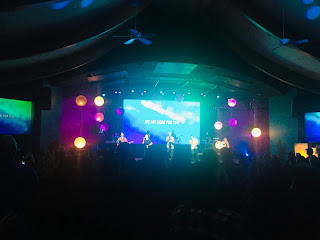MK 11:1-11 THE TRIUMPHAL ENTRY DRAFT III 03/22/98
SETTING: Courtyard of the Temple
CHARACTERS: Peter, Pharisee, Scribe, onlookers?
PETER: It had been a really long day. Jesus and his entourage arrived at Jerusalem and went up to the Temple, but this was not your usual pilgrimage.
(Moves downstage R)
PHARISEE enters L, followed by SCRIBE (who is holding a palm frond and looks nervous). (Moves around, Looks around, picks up mike, moves to L/Center): WILL someone please tell me just WHAT has been going on around here!
SCRIBE (picks up mike, moves toward Pharisee): Well, there were these all these people in the road coming up the hill. All I could hear was "Hosanna!" and something that sounded like "Kingdom of David".
PHARISEE (Looks around, spots Peter): I ... wonder... You there! (Gestures to Peter) Come here!
PETER (Goes toward Pharisee, bows slightly): Yessir?
PHARISEE: You hang around with this Jesus fellow; I know I've seen you. Did he have anything to do with this..this riot today?
PETER: I didn't see anything like a riot, but yes, he was here.
SCRIBE: Yes, that was him! He was riding on this little donkey, and ...
PHARISEE (interrupting): What is that? (Points to palm branch)
SCRIBE: This? (waves palm branch) Oh, this! Like I said, I was trying to find out what was going on, and somebody stuck it in my hand.
PHARISEE (To Peter): Please, start at the beginning. What is going ON here?
PETER: All I know is that he sent a couple of us to get this colt--the guy was expecting us. As soon as he started to ride toward the city, somebody started the Hosannas, and the chant about the Kingdom of David. Jesus didn't say anything at all--honest!
PHARISEE (To Peter): Yeah, sure, uh-huh. You do realize, don't you, you can't take on Rome with a few children armed with nothing more than palms. It takes money--political action committees--maybe buy a few Senators. Three years this man has been talking about a Kingdom, and here he is--coming into Jerusalem--the Holy City itself--like some sort of conquering king. If he is who he says he is, there ought to be legions of angels, as well.
SCRIBE(Looks around): Where is he now?
PETER (Puzzled): Gone home
SCRIBE: I don't believe it. He had that whole crowd in the palm of his hand--they would have done anything he asked. And what does he do? He goes HOME! Blows the whole thing!
PETER: What else? Even you should know by now that whatever he means by "kingdom" is not about power and influence.
PHARISEE: Well, you'd better keep whatever power and influence you have with him to keep him under wraps before he gets into REAL trouble! Let's go..(Exits L, followed by SCRIBE, who has dropped his palm branch.)
PETER picks up branch, looks at it wonderingly, carries it off R.
@ Cal



























